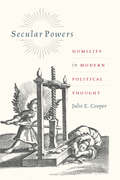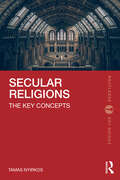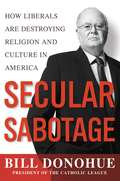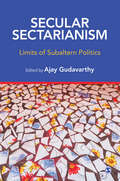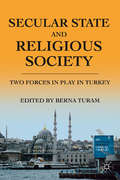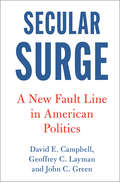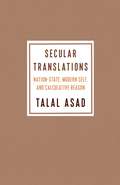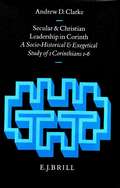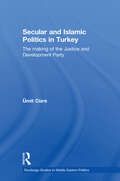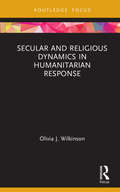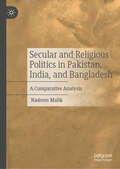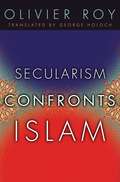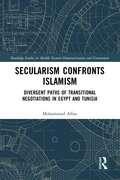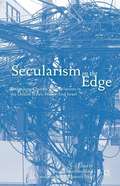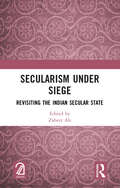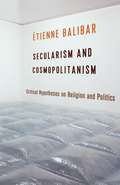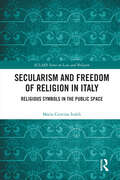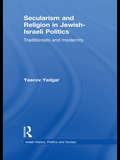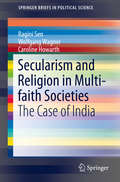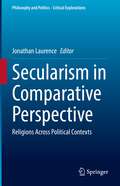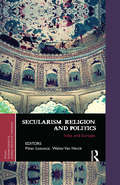- Table View
- List View
Secular Powers: Humility in Modern Political Thought
by Julie E. CooperSecularism is usually thought to contain the project of self-deification, in which humans attack God’s authority in order to take his place, freed from all constraints. Julie E. Cooper overturns this conception through an incisive analysis of the early modern justifications for secular politics. While she agrees that secularism is a means of empowerment, she argues that we have misunderstood the sources of secular empowerment and the kinds of strength to which it aspires. Contemporary understandings of secularism, Cooper contends, have been shaped by a limited understanding of it as a shift from vulnerability to power. But the works of the foundational thinkers of secularism tell a different story. Analyzing the writings of Hobbes, Spinoza, and Rousseau at the moment of secularity’s inception, she shows that all three understood that acknowledging one’s limitations was a condition of successful self-rule. And while all three invited humans to collectively build and sustain a political world, their invitations did not amount to self-deification. Cooper establishes that secular politics as originally conceived does not require a choice between power and vulnerability. Rather, it challenges us—today as then—to reconcile them both as essential components of our humanity.
Secular Religions: The Key Concepts (Routledge Key Guides)
by Tamás NyirkosSecular Religions: The Key Concepts provides a concise guide to those ideologies, worldviews, and social, political, economic, and cultural phenomena that are most often described as the modern counterparts of traditional religions.Although there are many other terms in use (quasi, pseudo, ersatz, political, civil, etc.), it is “secular religion” that best expresses the problematic nature of all such descriptions, which maintain that modern belief systems and practices are secular on the one hand and religious on the other. Today, the topic is as popular as ever, and secular religions are discovered far and wide. Hence, a critical summary is urgently necessary. The juxtaposed title is itself an expression of ironic distance. The book emphasizes inherent tensions of relevant literature in a critical and informative fashion. The author provides over 100 entries, from abortion to wokeness, as well as a detailed introduction, which gives an overview of the different definitions of “religion” and “secular religion” as well as the history of secular-religious comparisons. The main text reconstructs the argument of several key works on each given topic, while lists of sources for further reading are provided at the end of each entry.This book provides a clear introduction to “secular religions” and will appeal to researchers and students of religious studies, political philosophy, political theology, the history of ideologies, and cultural studies.
Secular Sabotage: How Liberals Are Destroying Religion and Culture in America
by William A. DonohueThis assault is not happening from accident or whim. It is happening because disaffected liberals have deliberately set out to upend our Judeo-Christian traditions. Indeed, they are determined to tear down the traditional norms, values, and institutions that have been part of American society from its founding. The cultural debris that these saboteurs have created will take decades to clean up. In feisty prose Donohue explores our nation where a college student is threatened with expulsion because she prayed on campus, a civil rights organization protests a statue of Jesus found on the ocean floor and a housewife sues a school district to stop the singing of Rudolph The Red-nosed Reindeer at a school choral production. These are just a few examples cited that demonstrate a culture descending into madness. Donohue takes no prisoners as he digs out and exposes the groups behind this all-out attack on our Christian traditions. Among these are the radical atheists, the proponents of multiculturalism, the sexual libertines, the Hollywood elite with their not-so-hidden agenda and lawyers who collaborate for profit.
Secular Sectarianism: Limits of Subaltern Politics
by Ajay GudavarthySecularism is a tenet that is fundamental to Indian democracy and enshrined in the Constitution. However, its practice has been severely hampered in recent times largely due to the secular sectarianism pursued by secular, democratic and progressive political formations. This implies the tendency of specific secular political movements to act as if their agenda are exclusively important. Secular sectarianism has gradually polarized communities and advanced a woefully limited political imagination, leading to the proliferation of conflicts between various marginalized groups—Dalits, tribals, OBCs, Muslims, women and the Left. Secular Sectarianism: Limits of Subaltern Politics includes several accounts of such conflicts, opening up a new area of study for further conceptualization. This book emphasizes that citizenship in practice is expressed through the right to speak for others and not just for oneself. Progress can be made only by opening up dialogues within and across political communities. This is essential for India’s survival as a secular and democratic nation. Progressive politics needs to move towards affinity and an idea of shared spaces.
Secular State and Religious Society: Two Forces in Play in Turkey
by Berna TuramOn the basis of original, empirically rich, and theoretically sound social research, the chapters in this volume reveal and analyze the complex relations between the secular government of Turkey and the religious persons and society within the Turkish state.
Secular State and Religious Society: Two Forces in Play in Turkey
by Berna TuramOn the basis of original, empirically rich, and theoretically sound social research, the chapters in this volume reveal and analyze the complex relations between the secular government of Turkey and the religious persons and society within the Turkish state.
Secular Surge: A New Fault Line in American Politics (Cambridge Studies in Social Theory, Religion and Politics)
by David E. Campbell John C. Green Geoffrey C. LaymanAmerican society is rapidly secularizing–a radical departure from its historically high level of religiosity–and politics is a big part of the reason. Just as, forty years ago, the Religious Right arose as a new political movement, today secularism is gaining traction as a distinct and politically energized identity. This book examines the political causes and political consequences of this secular surge, drawing on a wealth of original data. The authors show that secular identity is in part a reaction to the Religious Right. However, while the political impact of secularism is profound, there may not yet be a Secular Left to counterbalance the Religious Right. Secularism has introduced new tensions within the Democratic Party while adding oxygen to political polarization between Democrats and Republicans. Still there may be opportunities to reach common ground if politicians seek to forge coalitions that encompass both secular and religious Americans.
Secular Translations: Nation-State, Modern Self, and Calculative Reason (Ruth Benedict Book Series)
by Talal AsadIn Secular Translations, the anthropologist Talal Asad reflects on his lifelong engagement with secularism and its contradictions. He draws out the ambiguities in our concepts of the religious and the secular through a rich consideration of translatability and untranslatability, exploring the circuitous movements of ideas between histories and cultures.In search of meeting points between the language of Islam and the language of secular reason, Asad gives particular importance to the translations of religious ideas into nonreligious ones. He discusses the claim that liberal conceptions of equality represent earlier Christian ideas translated into secularism; explores the ways that the language and practice of religious ritual play an important but radically transformed role as they are translated into modern life; and considers the history of the idea of the self and its centrality to the project of the secular state. Secularism is not only an abstract principle that modern liberal democratic states espouse, he argues, but also a range of sensibilities. The shifting vocabularies associated with each of these sensibilities are fundamentally intertwined with different ways of life. In exploring these entanglements, Asad shows how translation opens the door for—or requires—the utter transformation of the translated. Drawing on a diverse set of thinkers ranging from al-Ghazālī to Walter Benjamin, Secular Translations points toward new possibilities for intercultural communication, seeking a language for our time beyond the language of the state.
Secular and Christian Leadership in Corinth: A Socio-Historical and Exegetical Study of 1 Corinthians 1-6
by Andrew D. ClarkeThis volume traces the influences of first century Corinthian secular leadership on local church leadership as reflected in 1 Corinthians 1-6. It then shows how Paul modifies the Corinthian understanding of church leadership. By comparing secular leadership in first century Corinthian society with leadership in the Corinthian church, it has been argued that one of Pauls major concerns with the church in Corinth is the extent to which significant members in the church were employing secular categories and perceptions of leadership in the Christian community. This volume has adopted the method of assessing the New Testament evidence in the light of its social and historical background. Both literary and non-literary sources, rather than modern sociological models, were employed in making the comparison.
Secular and Islamic Politics in Turkey: The Making of the Justice and Development Party (Routledge Studies in Middle Eastern Politics #6)
by Ümit CizreTurkey is ninty-nine per cent Muslim, its ruling party, Justice and Development Party (JDP), comes from but denies its Islamist pedigree and has a very secular feel. However, the deeply secular regime distrusts the JDP with regard to its 'true' colours. This book makes sense of these paradoxical perceptions which have characterized Turkey’s politics since the JDP has come to power in 2002. The key momentum for shaping the nature and trajectories of the ruling party of Turkey since 2002, the JDP, has been the ‘identity’ question. The JDP’s commitment to transform Turkey’s politics was part of its engagement to remake its own identity. The JDP’s adoption of a conservative-democrat identity has rested on a new understanding of Westernization, secularism, democracy and the role and relevance of Islam in politics. The book’s central problematic is to explain both the politics of change the JDP initiated and sustained in the first three years in office and the politics of retreat it has made from its reformist discourse since 2005. The book analyzes not just the catalysts for its reformist discourse of the first 3 years but tries to explain its reversal to an inward-looking conservative nationalist course. By approaching this topical debate from the conceptual stance rather than a party-centered approach, Ümit Cizre identifies that the change the JDP has initiated within Turkey’s political Islam and in Turkish politics is the product of an interactive process between many levels, actors, forces and historical periods. The forces and actors covered include: global forces of Islam the secular establishment and its popular extensions the past and present Islamic actors in political and non-political spheres the changing balance of forces in the region which frame the EU and the US policies toward the JDP. Secular and Islamic Politics in Turkey is a valuable contribution to the study of globalization and ‘change’ in contemporary political Islam, the relationship between religion and politics, and secularism and political Islam. As such, it will be of interest to students and researchers alike in the area of Islamic politics, democratization, European Union and political Islam, and globalization.
Secular and Religious Dynamics in Humanitarian Response (Routledge Research in Religion and Development)
by Olivia J. WilkinsonThis book investigates the ways in which the humanitarian system is secular and understands religious beliefs and practices when responding to disasters. The book teases out the reasons why humanitarians are reluctant to engage with what are seen as "messy" cultural dynamics within the communities they work with, and how this can lead to strained or broken relationships with disaster-affected populations and irrelevant and inappropriate disaster assistance that imposes distant and relatively meaningless values. In order to interrogate secular boundaries within humanitarian response, the book draws particularly on qualitative primary data from the aftermath of Typhoon Haiyan in the Philippines. The case study shows how religious practices and beliefs strongly influenced people's disaster experience, yet humanitarian organisations often failed to recognise or engage with this. Whilst secularity in the humanitarian system does not completely exclude religious participation and expression, it does create biases and boundaries. Many humanitarians view their secularity as essential to their position of impartiality and cultural sensitivity in comparison to what were seen as the biased and unprofessional beliefs and practices of religions and religious actors, even though disaster-affected people felt that it was the secular humanitarians that were less impartial and culturally sensitive. This empirically driven examination of the role of secularity within humanitarianism will be of interest to the growing field of "pracademic" researchers across NGOs, government, consultancy, and think tanks, as well as researchers working directly within academic institutions.
Secular and Religious Politics in Pakistan, India, and Bangladesh: A Comparative Analysis
by Nadeem MalikThis book thoroughly explores the complex relationship between secularism and religious politics in South Asia. It examines the historical and contemporary factors that have influenced the political landscapes of Pakistan, India, and Bangladesh, focusing on how colonial legacies, nation-building processes, and religious ideologies have shaped governance and social structures. Through comparative analysis, the book delves into the rise of Hindutva in India, the struggle between secularism and Islamism in Bangladesh, and the role of Islam in Pakistan's politics. By integrating diverse theoretical perspectives and historical contexts, this book offers a comprehensive understanding of the evolving nature of secularism and religious politics in these three nations. It also provides insights into the broader implications for democracy, pluralism, and religious freedom in South Asia. This book is essential reading for scholars, policymakers, and anyone interested in the intersection of religion and politics in one of the world's most complex and dynamic regions.
Secularism Confronts Islam
by Olivier RoyThe denunciation of fundamentalism in France, embodied in the law against the veil and the deportation of imams, has shifted into a systematic attack on all Muslims and Islam. This hostility is rooted in the belief that Islam cannot be integrated into French-and, consequently, secular and liberal-society. However, as Olivier Roy makes clear in this book, Muslim intellectuals have made it possible for Muslims to live concretely in a secularized world while maintaining the identity of a "true believer." They have formulated a language that recognizes two spaces: that of religion and that of secular society.Western society is unable to recognize this process, Roy argues, because of a cultural bias that assumes religious practice is embedded within a specific, traditional culture that must be either erased entirely or forced to coexist in a neutral, multicultural space. Instead, Roy shows that new forms of religiosity, such as Islamic fundamentalism and Christian evangelicalism, have come to thrive in post-traditional, secular contexts precisely because they remain detached from any cultural background. In recognizing this, Roy recasts the debate concerning Islam and democracy. Analyzing the French case in particular, in which the tension between Islam and the conception of Western secularism is exacerbated, Roy makes important distinctions between Arab and non-Arab Muslims, hegemony and tolerance, and the role of the umma and the sharia in Muslim religious life. He pits Muslim religious revivalism against similar movements in the West, such as evangelical Protestantism and Jehovah's Witnesses, and refutes the myth of a single "Muslim community" by detailing different groups and their inability to overcome their differences. Roy's rare portrait of the realities of immigrant Muslim life offers a necessary alternative to the popular specter of an "Islamic threat." Supporting his arguments with his extensive research on Islamic history, sociology, and politics, Roy brilliantly demonstrates the limits of our understanding of contemporary Islamic religious practice in the West and the role of Islam as a screen onto which Western societies project their own identity crisis.
Secularism Confronts Islamism: Divergent Paths of Transitional Negotiations in Egypt and Tunisia (Routledge Studies in Middle Eastern Democratization and Government)
by Mohammad AffanThis book provides in-depth examination of the recent confrontation between Islamists and secularists in Egypt and Tunisia. Presenting a new approach to understand Islamism and secularism, the research addresses the variables that could affect the outcome of transitional negotiations. The secularist-Islamist conflict proved to be a major hindrance for democratisation and a main source of political instability in the Middle East. During the Arab Spring, disputes between both political trends sparked shortly after getting rid of their common enemy: the autocratic rulers. First, they disagreed on how to lead the transitional period. Then, polarisation grew deeper with the political competition in the parliamentary and presidential elections and the ideological disagreements during the drafting of the constitution. Eventually, this conflict put Tunisia at a verge of civil strife in the summer of 2013 and led to collapse of the transitional process in Egypt after the military coup. Examining the causes of the conflict between the secularists and the Islamists during the transitional period, the work provides new insights from the Arab Spring experience. Updating the transition literature, the book is a key resource to academics and students interested in democratization theory and Middle East politics.
Secularism On The Edge
by Jacques Berlinerblau Sarah Fainberg Aurora NouWhat is secularism, and why does it matter? In an era marked by global religious revival, how do countries navigate the presence of faith in the public square? In this dynamic collection of essays, leading scholars from around the world, including Israeli novelist A. B. Yehoshua and French female rabbi Delphine Horvilleur, examine the condition of church-state relations in three pivotal countries: the United States, France, and Israel. Their analyses are rooted in a wide variety of disciplines, ranging from ethnography and demography to political science, gender studies, theology, and law. Prominent among the points addressed are the crippling nomenclatural confusions that have so hampered not only secularism as a political ideology, but secularism as an academic construct. This reader-friendly volume also offers a critical and nuanced look at how women are impacted by secular governance. Though secularism is often equated with modernity and progress, including with regard to gender equality, our contributors find that the truth is infinitely more complicated.
Secularism Under Siege: Revisiting the Indian Secular State
by Zaheer AliThis anthology makes a discerning attempt to bring into focus myriad dimensions of secularism and the foremost impediments to its attainment. The scholars who contributed to this volume have underscored that the disconnect between a modern-secular state and a conservative society is detrimental to recognizing an ideal secular-democratic polity. Then there is the burden of the past centuries that independent India has to carry on its young shoulders. The political factions in India invent their own historical narratives to advance their political agenda coupled with political and economic arguments leading to social dissensions and communal hatred, the ugliest manifestation of which is communal violence that occasionally takes on the form of anti-minority pogroms. The academic critiques of the concept of secularism and its correlated premises belted in this volume shall be of assistance not only to the scholars but also to the students of social sciences and the conscientious readers interested in knowing about the current socio-political milieu. This title is co-published with Aakar Books. Print editions not for sale in South Asia (India, Sri Lanka, Nepal, Bangladesh, Pakistan and Bhutan)
Secularism and Cosmopolitanism: Critical Hypotheses on Religion and Politics (European Perspectives: A Series in Social Thought and Cultural Criticism)
by Étienne BalibarWhat is the relationship between cosmopolitanism and secularism—the worldwide and the worldly? While cosmopolitan politics may seem inherently secular, existing forms of secularism risk undermining the universality of cosmopolitanism because they privilege the European tradition over all others and transform particular historical norms into enunciations of truth, valid for all cultures and all epochs. In this book, the noted philosopher Étienne Balibar explores the tensions lurking at this troubled nexus in order to advance a truly democratic and emancipatory cosmopolitanism, which requires a secularization of secularism itself.Balibar argues for the idea of the universal against its particular dominant institutions. He questions the assumptions that underlie popular ideas of secularism and religion and outlines the importance of a new critique for the contemporary world. Balibar holds that conflicts between religious and secular discourses need to be reframed from a point of view that takes into account the cultural hybridization, migration and mobility, and transformation of borders that have reshaped the postcolonial age. Among the topics discussed are the uses and misuses of the category of religion and the religious, the paradoxical genealogy of monotheism, French laïcité’s identitarian turn, and the implications of the responses to the Charlie Hebdo attacks for an extended definition of free speech. Going beyond circumscribed notions of religion and the public sphere, Secularism and Cosmopolitanism is a profound rethinking of identity and difference that seeks to make room for a renewed political imagination.
Secularism and Freedom of Conscience
by Charles Taylor Jocelyn MaclureSecularism: the definition of this word is as practical and urgent as income inequalities or the paths to sustainable development. In this wide-ranging analysis, Jocelyn Maclure and Charles Taylor provide a clearly reasoned, articulate account of the two main principles of secularism—equal respect, and freedom of conscience—and its two operative modes—separation of Church (or mosque or temple) and State, and State neutrality vis-à-vis religions. But more crucially, they make the powerful argument that in our ever more religiously diverse, politically interconnected world, secularism, properly understood, may offer the only path to religious and philosophical freedom. Secularism and Freedom of Conscience grew out of a very real problem—Quebec’s need for guidelines to balance the equal respect due to all citizens with the right to religious freedom. But the authors go further, rethinking secularism in light of other critical issues of our time. The relationship between religious beliefs and deeply-held secular convictions, the scope of the free exercise of religion, and the place of religion in the public sphere are aspects of the larger challenge Maclure and Taylor address: how to manage moral and religious diversity in a free society. Secularism, they show, is essential to any liberal democracy in which citizens adhere to a plurality of conceptions of what gives meaning and direction to human life. The working model the authors construct in this nuanced account is capacious enough to accommodate difference and freedom of conscience, while holding out hope for a world in which diversity no longer divides us.
Secularism and Freedom of Religion in Italy: Religious Symbols in the Public Space (ICLARS Series on Law and Religion)
by Maria Cristina IvaldiThe display of religious symbols in the public space has been the subject of much debate. This book provides an overview of the presence of religious symbols in Italian public institutions from a legal standpoint.The situation is analysed from the perspective of the principles of laicità/secularism, as defined by the Constitutional Court, and freedom of religion. It is argued that while the display of religious symbols in public institutions has been widely investigated doctrinally, the wearing of religious symbols in Italy has generally been neglected. Key cases are examined in light of national jurisprudence as well as intervention by the European Court of Human Rights and relevant judgments from foreign courts regarding this issue. Finally, the work considers the presence of religious symbols that transcend national borders, as in the case of arts, sport and advertising. A comparison is made with the French system which takes a very different approach. The book outlines possible ways forward in light of the growing interculturality of European societies.It will be a valuable resource for academics, researchers and policy-makers working in the areas of law and religion, and comparative law.
Secularism and Religion in Jewish-Israeli Politics: Traditionists and Modernity (Israeli History, Politics and Society)
by Yaacov YadgarCommon discourse on Jewish identity in Israel is dominated by the view that Jewish Israelis can, and should, be either religious or secular. Moving away from this conventional framework, this book examines the role of secularism and religion in Jewish society and politics. With a focus on the ‘traditionists’ (masortim) who comprise over a third of the Jewish-Israeli population, the author examines issues of religion, tradition and secularism in Israel, giving a fresh approach to the widening theoretical discussion regarding the thesis of secularisation and modernity and exploring the wider implications of this identity. Yadgar’s conclusions have significant social, cultural and political implications, serving not only as a new contribution to the academic discourse on Jewish-Israeli identity, but as a platform upon which traditionist positions on central issues of Israeli politics can be heard. Offering a detailed investigation into a central and important Jewish-Israeli identity construct, the book is relevant not only to the study of Jewish identity in Israel but also within the wider social-theoretical issues of religion, tradition, modernity and secularization. The book will be of great interest to students of Israeli society and to anyone looking into the issues of Jewish identity, Israeli nationalism and ethnicity, religion and politics in Israel, and the sociology of religion.
Secularism and Religion in Multi-faith Societies
by Ragini Sen Wolfgang Wagner Caroline HowarthThis Brief looks at the illustrative case of the Hindu-Muslim conflict in India, with the aim of understanding the dynamics of lived secularism as it exists in traditional multi-faith societies such as India. The data analyzed in this Brief comprise many interviews, conducted amidst Hindus and Muslims, with respondents of both sexes living in slum and middle class regions in the city of Mumbai. The volume begins by giving a brief summary of the historical and cultural background to the present situation in India. It then traces complementarities and similarities of opinions across diverse constituencies which cluster around three main anchoring points: communication, re-presentations and operationalizing of a shared dream. The first point explores the need to understand and to be understood, encourages processes of mutual acculturation, and describes the sensitive decoding of cultural symbols such as dress codes. The second point discusses changes in mind sets and mutual perceptions, where Muslims and Islam are portrayed in a balanced way and exploitation of religion for political purposes is stopped. The third main point is the involvement of the common, regular person, and a focus on children, as the unifying hope for the future. Throughout the volume, emphasis is on moral maturation, cultural interpretation in lieu of cultural imposition and creation of a sensitive media policy. The issues raised may help craft interdisciplinary and international frameworks, which address conflict resolution in culturally diverse multi-faith societies. Accordingly, the book concludes with policy recommendations for supporting the peaceful coexistence of secularism and religion in society from a peace psychological perspective.
Secularism in Comparative Perspective: Religions Across Political Contexts (Philosophy and Politics - Critical Explorations #23)
by Jonathan LaurenceThis book confronts the key questions surrounding comparative secularism in historical perspective. The contributions critically consider the normative ideas and alternative political arrangements that govern religion’s relation to politics and to the public and private spheres. Containing contributions by world-renowned scholars such as Michael Walzer, Asma Afsaruddin and Sudipta Kaviraj, this book recounts the arguments, debates, and disputations regarding secular arguments for accommodating religion. It does so in both critical and appreciative ways and describes some of the outcomes in actually existing institutions, policies, and practical arrangements. With the addition of many non-Western experiences and viewpoints on how secularism is theorized and lived, politically and historically and from Europe and Asia to Africa and the Americas, this volume is of great value political philosophers across the globe.
Secularism, Identity, and Enchantment
by Akeel BilgramiBringing clarity to a subject clouded by polemic, Secularism, Identity, and Enchantment is a rigorous exploration of how secularism and identity emerged as concepts in different parts of the modern world. At a time when secularist and religious worldviews appear irreconcilable, Akeel Bilgrami strikes out on a path distinctly his own, criticizing secularist proponents and detractors, liberal universalists and multicultural relativists alike.<P><P> Those who ground secularism in arguments that aspire to universal reach, Bilgrami argues, fundamentally misunderstand the nature of politics. To those, by contrast, who regard secularism as a mere outgrowth of colonial domination, he offers the possibility of a more conceptually vernacular ground for political secularism. Focusing on the response to Salman Rushdie's Satanic Verses, Bilgrami asks why Islamic identity has so often been a mobilizing force against liberalism, and he answers the question with diagnostic sympathy, providing a philosophical framework within which the Islamic tradition might overcome the resentments prompted by its colonized past and present.<P> Turning to Gandhi's political and religious thought, Bilgrami ponders whether the increasing appeal of religion in many parts of the world reflects a growing disillusionment not with science but with an outlook of detachment around the rise of modern science and capitalism. He elaborates a notion of enchantment along metaphysical, ethical, and political lines with a view to finding in secular modernity a locus of meaning and value, while addressing squarely the anxiety that all such notions hark back nostalgically to a time that has past.
Secularism, Islam and Modernity
by M T Ansari Syed Alam KhundmiriSyed Alam Khundmiri (1922-83) was an important intellectual figure of his times, a true humanist with rare philosophical insights ranging over a wide field. The volume brings together Khundmiri's seminal essays which set out his dominant concerns: Marxism, with its indifference to questions of minorities in nationalism; existentialism, which he saw as being closed off to the problems of community; and Islam, which he examined in relation to history and notions of time and change. Overall, this absorbing collection of essays encapsulates Khundmiri's dual project of situating Islam in the modern context and scrutinizing the modern in the light of Islam. Particularly relevant in the present context of the increasing sacralization of politics, it will be read with great interest by students and scholars of philosophy, history, sociology, Islamic studies, Marxism, comparative religion, cultural studies, and political and social theory, as well as by the aware and concerned lay reader.
Secularism, Religion, and Politics: India and Europe (Ethics, Human Rights and Global Political Thought)
by Péter Losonczi Walter Van HerckThis book highlights the relationship between the state and religion in India and Europe. It problematizes the idea of secularism and questions received ideas about secularism. It also looks at how Europe and India can learn from each other about negotiating religious space and identity in this globalised post-9/11 world.
